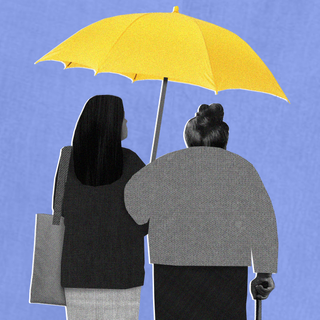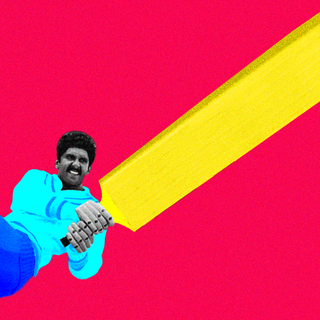
It’s Okay: To Not Want to Change With the New Year
Sometimes not wanting to change is a sign of security and self-awareness.

In It’s Okay, we defend our most embarrassing, unpopular opinions.
Every 11:59 pm on December 31st plays out in a familiar fashion. It’s a cocktail of emotions: a tinge of excitement about starting afresh; a flavor of sadness as I retrospect losses and failures; inexplicable anxiety about doing things; and a to-do list about everything I would do differently. They all wind down like a thread to one question: What would I want to change about myself as we start “anew”?
Five days away from the glorious halls of 2022, the pressure to redefine or reinvent yourself couldn’t be higher. A simple Google search reveals multiple options (which read like a Ted Talk) on how to transform yourself and/or embrace change. It’s not just a catchy slogan, but taps into our desire to always look for something more. In other cases, it’s just a convenient way to escape the crappiness of a year people would rather forget.
But the premise of that question is flawed. It automatically assumes people want to change, or should change. This assumption is not innocuous; the emotionally stressful time of holidays and new years makes the whole transformation tirade a fraught process.
Evidently, the appeal of “new year, new me” is strong. But just like the force in the Star Wars universe, not everyone feels this force or can even wield it to their benefit. A calendar change doesn’t magically wipe away years’ of character markers I have come to happily (and unhappily) identify with. While it is always important to think about what you would change about yourself, timing it around the days of December 31-January 1 also feels like an exercise in telling people how to be. It is one thing for people to want a fresh start; completely another for them to think of it as a maxim they must strictly abide by. “If you want to change something in your life, you do it then and there, don’t start to think about changing yourself just because it’s the start of a new year,” one Quora user noted.
Plus, this month already carries the weight of anxiety and stress; of people making resolutions and feeling guilty about not resolving them; of expectations of socialization that end up making people feel lonelier. According to a study, 83% of participants felt let down by their plans for December 31 — they thought they would have a better time. The feeling of “holiday blues,” when superimposed with the added pressure to change, may set the stage for disappointment. Think of it this way: someone is in despair about not finding a job, the advice to them is to boost their resume or change something about themselves, and they think that one particular change will be revolutionary to their life story. In reality, it doesn’t happen. Some would argue it’s the thought that counts — the desire to change, to be a seemingly better version. But this again overlooks the emotional burden people may undertake to make two fractious ends meet.
Related on The Swaddle:
Why We Expect So Much of Each New Year — and Every January Feels Like a Letdown
There also seems to be a proportion problem when it comes to endorsing change as a one-stop solution. The assumption is that the change needs to be big to actually make a difference — completely overlooking and undervaluing the small things people actually do to be better versions of themselves. “It is the repeated pattern of small behaviors that leads to significant results. Each day we make the choice to become one percent better or one percent worse, but so often the choices are small enough that we miss them,” behavioral psychologist James Clear wrote.
Plus also, most of the time a desire to change is not met with a change in and of itself. “A new year signifies nothing in itself. And to expect that this year everything will be different without a total paradigm shift in thought and behavior is nothing but pipe dreams,” as psychologist Jason Hew wrote. Somewhere between 81% and 92 % of New Year’s Resolutions fail. This may be because people try to change everything at once, or set unrealistic expectations of themselves, or seek a direct result instead of a ritual. Irrespective, these are behavioral tendencies that come with the realm of the “new year, new me” spiel.
The idea of change feels further chaotic in a world unsure of its future. The new Omicron variant, along with a prospective third wave, spells much uncertainty. The pandemic appears to play time like an “evil accordion,” setting it on an endless loop. How does one even begin to think of change when things around us have carried a similar tension for the last two years? Some stability and growth irrespective of where we are in the year and the pandemic feel like a sustainable solution. No wonder a friend remarked to me recently: “I don’t care about learning new habits (you know, the banana bread baking spree or becoming a plant parent), but all I want to do is stay afloat this new year.”
If anything, sometimes not wanting to change is a marker of security and self-awareness. The winds of the new year are not always meant to sweep us off our feet. Sometimes, if you hold your ground and are sure of yourself, you can stand and appreciate the breeze too.
It’s okay to make your peace with it — and say goodbye to the “new year, new me” dictum along with 2021.
Saumya Kalia is an Associate Editor at The Swaddle. Her journalism and writing explore issues of social justice, digital sub-cultures, media ecosystem, literature, and memory as they cut across socio-cultural periods. You can reach her at @Saumya_Kalia.
Related


The Buzz Cut: Nation Runs Out of Things to Look Forward to, Eagerly Awaits 1983
